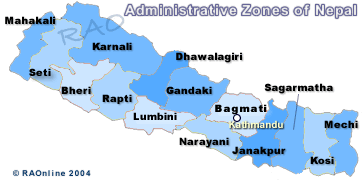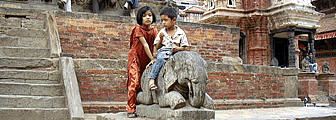|
Nepal's
Civil War: Caution
|
 |
Maoist
and security forces activities have been reported from ... |
Major
incidents have been reported from the following districts:
The
Nepalese Home Ministry has designated the following districts as Sensitive
Class-A, namely Dolakha, Ramechhap, Sindhuli, Kavrepalanchowk, Sindhpalchowk,
Gorkha, Dang, Surkhet and Achham while other sensitive districts are Khotang,
Okhaldhunga, Udaipur, Marwanpur, Lalitpur, Nuwakot, Dhading, Tanahu, Lamjung,
Parbat, Baglung, Gulmi, Arghakhanchi, Bardiya, Dailekh, Jumla and Dolpa.
Travel
advice:
Security
officials named the following locations as places through which Maoist
rebels transport weaponry: Gokuleshwor, Melauli, Purchungehat and Kuwakot
(Baitadi), Belauri (Kanchanpur), Jogbudha (Dadeldhura), Ramaroshan
and Binayak (Achham) and some areas of Bajura district. Travel to those
locations and surrounding areas is not recommended.
January
2006: A four-month long unilateral ceasefire called by Maoist rebels ended.
August
2003: Nepal cease-fire collapses
A
seven-month old cease-fire in Nepal between the government and Maoist rebels
has collapsed after the rebels declared there was no justification for
the truce amid an uncompromising stance from the Nepali Government
 |
| Travelling
with Caution: Guerrilla war has no front lines. |
| Guerrillas
operate in the midst of, and often hidden or protected by, civilian populations.
The purpose of guerrilla war is not to engage an enemy army in direct confrontation,
but rather to harass and punish it so as to gradually limit its operation
and effectively liberate territory from its control. |
|
The
guerrillas operate to varying degrees in 68 of the 75 districts that comprise
Nepal. Their influence varies between moderate to extreme in these districts.
October
27, 2003
 |
The
CPN-Maoist chairman Prachanda said in a statemant published in a Maoist-run
news service that rebel policy did not allow foreign nationals to be targeted.
The Maoist policy we be also applied to American tourists and officials. |
 |
Royal
Nepal Government: Integrated Security and Development Programme (ISDP)
Maoist
hotbed districts (ISDP list) ... |
| Dailekh,
Dang, Dolakha, Gorkha, Jajarkot, Kalikot, Lamjung, Pyuthan, Ramechhap,
Salyan, Surkhet, Rolpa and Rukum |
Government
decision (26.11.2001)
Solukhumbu
is the district put in the Grade C in the list of the Maoist insurgency.
The
Nepalese Home Ministry has designated these districts ....
| 'Sensitive
Class A' (Strongholds) |
'Sensitive
Class B' |
'Sensitive
Class C' |
| Rolpa,
Rukum, Jajarkot, Salyan, Pyuthan and Kalikot |
Dolakha,
Ramechhap, Sindhuli, Kavrepalanchowk, Sindhupalchowk, Gorkha, Dang, Surkhet
and Achham |
Khotang,
Okhaldhunga, Udaypur, Makwanpur, Lalitpur, Nuwakot, Dhading, Tanahu, Lamjung,
Parbat, Baglung, Gulmi, Arghakhachi, Bardiya, Dailekh, Jumla, Solokhumbu
and Dolpa. |
| Government
presence is limited to the district headquarters with the rest of each
district under Maoist control. |
|
|
|
 |
 |
The
fact is that the Maoists are every where. They are in the remote villages,
in the remote districts, in the urban areas, in the rural areas and they
are in Kathmandu as well. |
| Maoists
on the move: All of the 75 districts affected Maoists
are rapidly gaining ground |
 |
| The
Maoist people's war that began with khukuris and spears in a handful of
mid-western districts five years ago is now the most serious threat to
the monarchy and democracy. The Maoists now have modern weapons at their
disposal and have spread to all the 75 districts of the country. Except
for district headquarters, they now have effective control in more than
36 districts. In these districts government and administration are confined
to the headquarters. They are rapidly gaining ground in another nine districts. |
|
At
this rate the nine will also fall under their control in a few months,
forcing the government to confine itself to the headquarters. Maoist sources
say taking control of the headquarters won't be difficult if they are able
to occupy the periphery. But they are not advancing just yet because maintaining
control can be difficult. The most affected area is contiguous and concentrated
in the mid-western region. This is one of the most backward and least accessible
districts of Nepal. The affected areas are all too close to Kathmandu.
Many of the affected areas are spread out along Terai districts close to
India.
The
insurgency has affected almost all the 75 districts of the country (only
a handful of remote mountain districts remain untouched). Five contiguous
western Nepal districts are, for all practical purposes, under the control
of the Maoists. The civil war in Nepal between Maoist rebels and government
forces has affected all 75 of the 75 districts in the country, and has
led to more than 10,000 deaths and widespread displacement. According to
most estimates, 100,000 to 200,000 people, out of a population of approximately
26 million, have been displaced in Nepal.
| Districts
with people's governments |
The
Maoists have declared eight districts in Bheri, Karnali and Rapti Zones as having "people's governments" and they appear to be consolidating their
hold on districts on the periphery like Dang, Bajura and Dailekh. In Dolakha
district there is an "people's government" as well. |
|
 |
 |
Nepal's
problem is not the Maoist war but an entrenched coalition of corrupt politicians
and bureaucrats that profits from Maoist war. |
According
to government's own admission 32 districts are believed to be the hardest
hit where guerrillas roam freely and organize open mass meetings. Police
is controlling the headquarters , its surroundings and some of the highways
connecting the centres. The Maoists are controlling the countryside. The
Maoist installed their own adminstrations in
some districts.
| Please
avoid travelling in these districts. |
Achham
Baglung
Kailali
Kalikot
Jajarkot |
Dailekh
Dang(deukhuri)
Gorkha
(north)
Pyuthan
Rolpa |
Rukum
Salyan
Surkhet
Sindhuli
Taplejung
(Kachenjunga) |
|











